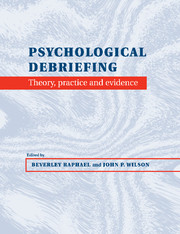Crossref Citations
This Book has been
cited by the following publications. This list is generated based on data provided by Crossref.
Neria, Yuval
2001.
Prevention of posttraumatic sequelae: Therapeutic intervention in trauma survivors.
Sozial- und Pr�ventivmedizin SPM,
Vol. 46,
Issue. 3,
p.
148.
Plant, Barbara
2001.
Psychological Trauma in the Police Service.
International Journal of Police Science & Management,
Vol. 3,
Issue. 4,
p.
327.
Mills, Bo
2001.
Impact of trauma on sexuality and relationships.
Sexual and Relationship Therapy,
Vol. 16,
Issue. 3,
p.
197.
Guerin, Bernard
2001.
Explanations of Bereavement, Grief, and Trauma: The Misuse of Both Mental and Foundational Terms.
European Journal of Behavior Analysis,
Vol. 2,
Issue. 2,
p.
154.
Klingman, Avigdor
2002.
From supportive-listening to a solution-focused intervention for counsellors dealing with political trauma.
British Journal of Guidance & Counselling,
Vol. 30,
Issue. 3,
p.
247.
Alexander, David A
2002.
The psychiatric consequences of trauma.
Hospital Medicine,
Vol. 63,
Issue. 1,
p.
12.
Robbins, Susan
2002.
The Rush to Counsel: Lessons of Caution in the Aftermath of Disaster.
Families in Society: The Journal of Contemporary Social Services,
Vol. 83,
Issue. 2,
p.
113.
Alexander, David Alan
and
Klein, Susan
2003.
Biochemical terrorism: Too awful to contemplate, too serious to ignore.
British Journal of Psychiatry,
Vol. 183,
Issue. 6,
p.
491.
Stallard, Paul
and
Salter, Emma
2003.
Psychological Debriefing with Children and Young People Following Traumatic Events.
Clinical Child Psychology and Psychiatry,
Vol. 8,
Issue. 4,
p.
445.
McNally, Richard J.
Bryant, Richard A.
and
Ehlers, Anke
2003.
Does Early Psychological Intervention Promote Recovery From Posttraumatic Stress?.
Psychological Science in the Public Interest,
Vol. 4,
Issue. 2,
p.
45.
Noy, Shabtai
2004.
The Traumatic Process: Conceptualization and Treatment.
Prehospital and Disaster Medicine,
Vol. 19,
Issue. 1,
p.
37.
Yule, William
Smith, Patrick
and
Perrin, Sean
2004.
Cognitive Behaviour Therapy for Children and Families.
p.
342.
Bryant, Richard A.
2004.
Posttraumatic Stress Disorder.
p.
187.
Raphael, Beverley
Dunsmore, Julie
and
Wooding, Sally
2004.
Terror and Trauma in Bali.
Journal of Aggression, Maltreatment & Trauma,
Vol. 9,
Issue. 1-2,
p.
245.
Dyregrov, Kari
2004.
Strategies of professional assistance after traumatic deaths: Empowerment or disempowerment?.
Scandinavian Journal of Psychology,
Vol. 45,
Issue. 2,
p.
181.
Noy, Shabtai
2004.
The Traumatic Process: Conceptualization and Treatment..
Traumatology,
Vol. 10,
Issue. 4,
p.
211.
Silove, Derrick
2004.
The Challenges Facing Mental Health Programs for Post-Conflict and Refugee Communities.
Prehospital and Disaster Medicine,
Vol. 19,
Issue. 1,
p.
90.
Murray, Judith A.
2004.
Making Sense of Resilience: A Useful Step on the Road to Creating and Maintaining Resilient Students and School Communities.
Australian Journal of Guidance and Counselling,
Vol. 14,
Issue. 1,
p.
1.
Jonsson, Anders
and
Segesten, Kerstin
2004.
Daily Stress and Concept of Self in Swedish Ambulance Personnel.
Prehospital and Disaster Medicine,
Vol. 19,
Issue. 3,
p.
226.
Silove, Derrick
2005.
Forced Migration and Mental Health.
p.
29.



